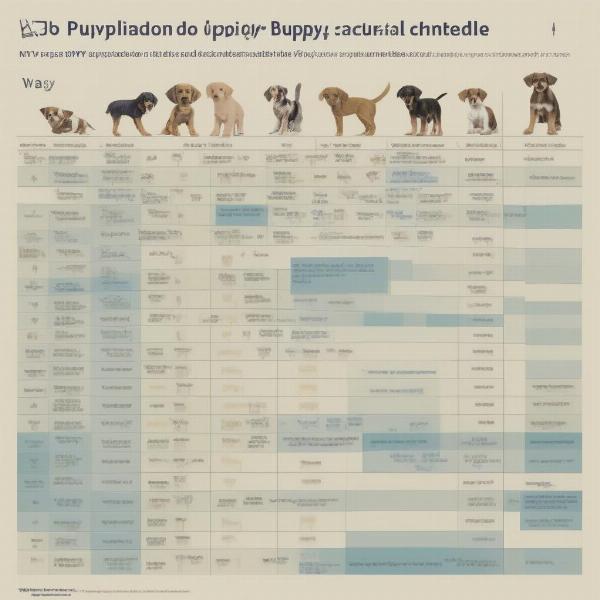Understanding the recommended dog vaccination schedule in Australia is crucial for responsible pet ownership. This guide provides a comprehensive overview of the essential vaccinations, timings, and potential risks, empowering you to make informed decisions about your dog’s health. Whether you’re a new dog owner or a seasoned pro, this guide will equip you with the necessary information to protect your furry friend from preventable diseases.
Understanding Core and Non-Core Vaccinations
Protecting your canine companion starts with understanding the different types of vaccinations. Core vaccines are essential for all dogs, safeguarding them against widespread and often severe diseases. Non-core vaccines, on the other hand, are recommended based on your dog’s lifestyle, environment, and risk factors.
Core Vaccines for Dogs in Australia
- Canine Distemper Virus (CDV): This highly contagious virus can cause respiratory illness, neurological problems, and even death.
- Canine Parvovirus (CPV): Parvovirus is a severe gastrointestinal disease, especially dangerous for puppies. It can cause vomiting, diarrhea, dehydration, and even be fatal.
- Canine Hepatitis (CAV-1/CAV-2): Canine hepatitis affects the liver and can lead to serious complications.
Non-Core Vaccines for Dogs in Australia
- Kennel Cough (Bordetella bronchiseptica and Canine parainfluenza virus): Kennel cough is a highly contagious respiratory infection, often spread in environments where dogs are in close contact, such as boarding kennels or dog parks.
- Leptospirosis: This bacterial infection can cause kidney and liver damage. It’s often spread through contaminated water or contact with infected wildlife.
The Typical Dog Vaccination Schedule in Australia
The typical vaccination schedule begins with puppies at 6-8 weeks old, followed by booster shots every 2-4 weeks until they are 16 weeks old. After this initial series, adult dogs typically receive booster vaccinations every one to three years, depending on the specific vaccine and your veterinarian’s recommendations.
Puppy Vaccination Schedule
- 6-8 weeks: First C3 vaccination (Distemper, Parvovirus, Hepatitis)
- 10-12 weeks: Second C3 vaccination
- 14-16 weeks: Third C3 vaccination
 Puppy Vaccination Schedule in Australia
Puppy Vaccination Schedule in Australia
Adult Dog Vaccination Schedule
- Every 1-3 years: C3 booster vaccination (or as recommended by your veterinarian)
- Annual or as needed: Non-core vaccinations (Kennel cough, Leptospirosis) based on risk assessment.
Potential Risks and Side Effects of Dog Vaccinations
While dog vaccinations are generally safe and highly effective, some dogs may experience mild side effects, such as lethargy, soreness at the injection site, or a low-grade fever. Serious side effects are rare. It’s important to discuss any concerns with your veterinarian.
“Vaccinations are a cornerstone of preventative veterinary care,” says Dr. Emily Carter, DVM, “While minor side effects can occur, the benefits of protecting your dog from serious diseases far outweigh the risks.”
What to Expect During Your Dog’s Vaccination Appointment
Your veterinarian will examine your dog before administering any vaccines. They will also discuss your dog’s lifestyle and risk factors to determine which non-core vaccinations are appropriate.
“Don’t hesitate to ask your veterinarian any questions you have about your dog’s vaccinations,” advises Dr. Carter, “We’re here to help you make informed decisions about your pet’s health.”
Conclusion
Following the recommended dog vaccination schedule in Australia is vital for safeguarding your dog’s health. By understanding the core and non-core vaccinations, the typical schedule, and potential risks, you can ensure your furry friend enjoys a long and healthy life. Consult with your veterinarian to personalize the vaccination schedule based on your dog’s individual needs and risk factors.
FAQ
- When should my puppy receive their first vaccinations? Puppies typically receive their first vaccinations at 6-8 weeks of age.
- Are there any side effects of dog vaccinations? Mild side effects such as lethargy or soreness at the injection site can occur.
- How often do adult dogs need booster vaccinations? Booster vaccinations are typically administered every one to three years.
- What are non-core vaccinations? Non-core vaccines are recommended based on your dog’s lifestyle and risk factors.
- Where can I find a veterinarian to vaccinate my dog? You can search online for local veterinary clinics in your area.
- Why is it important to vaccinate my dog? Vaccination protects your dog from preventable and potentially life-threatening diseases.
- What is the C3 vaccination? The C3 vaccination protects against Canine Distemper Virus, Canine Parvovirus, and Canine Hepatitis.
Find out more about caring for your dog:
- treat your dog australia
- shiba inu rescue dogs
- dogs and puppies for sale south australia
- blue dog adopt me
ILM Dog is your trusted international resource for expert dog care advice. We offer comprehensive information on dog breeds, health, training, nutrition, grooming, and much more. From puppy care to senior dog support, ILM Dog provides evidence-based information to help you navigate every stage of your dog’s life. Contact us at [email protected] or +44 20-3965-8624 for expert advice. Learn more at ILM Dog.